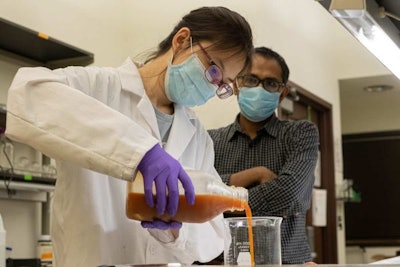
Fruit covered in eggs may not immediately sound like the most appealing combination of foods, but a new and inexpensive egg-based coating has been developed that can extend the shelf-life of fruit and vegetables. The all-natural coating protects fruit and vegetables from premature ripening and offers antimicrobial protection, which could result in more produce actually reaching consumers. Additionally, it avoids some of the inherent problems associated with wax coatings.
All natural
Scientists at Rice University Brown School of Engineering in the United States have developed a micron-thick coating that allows treated produce to resist rotting for extended periods and that is comparable to standard fruit and vegetable coatings.
Egg whites and yolks account for nearly 70% of the coating, which also contains nanoscale cellulose extracted from wood, which serves as a barrier to water and keeps produce from shriveling, a small amount of curcumin for its antimicrobial properties, and glycerol for elasticity.
Being all natural, the coating should appeal to today’s consumers, however, for anyone sensitive, or allergic, to egg, it can easily be washed off.
Along with being edible, the multifunctional coating retards dehydration, provides antimicrobial protection and is largely impermeable to both water vapor to retard dehydration and to gas to prevent early ripening.
Laboratory tests on dip-coated strawberries, avocados, bananas and other fruit showed that they maintained their freshness far longer than uncoated produce. Compression tests showed that fruit were significantly stiffer and firmer than untreated produce, demonstrating the coating’s ability to keep water in the produce, delaying the ripening produce.
Aiding sustainability
The research team notes that the new coating could solve problems for producers and consumers alike, but it could also offer a new income channel for egg producers.
The research notes that in the US, for example, 3% of annual egg production is sent to landfill. Using rejected eggs to preserve food could not only be beneficial for the egg industry but could provide an economically efficient and sustainable method to reduce the perishability of food.
This egg-based coating is robust, easy to produce, possesses extraordinary gas barrier properties and could be sourced from eggs that are otherwise lost.


















